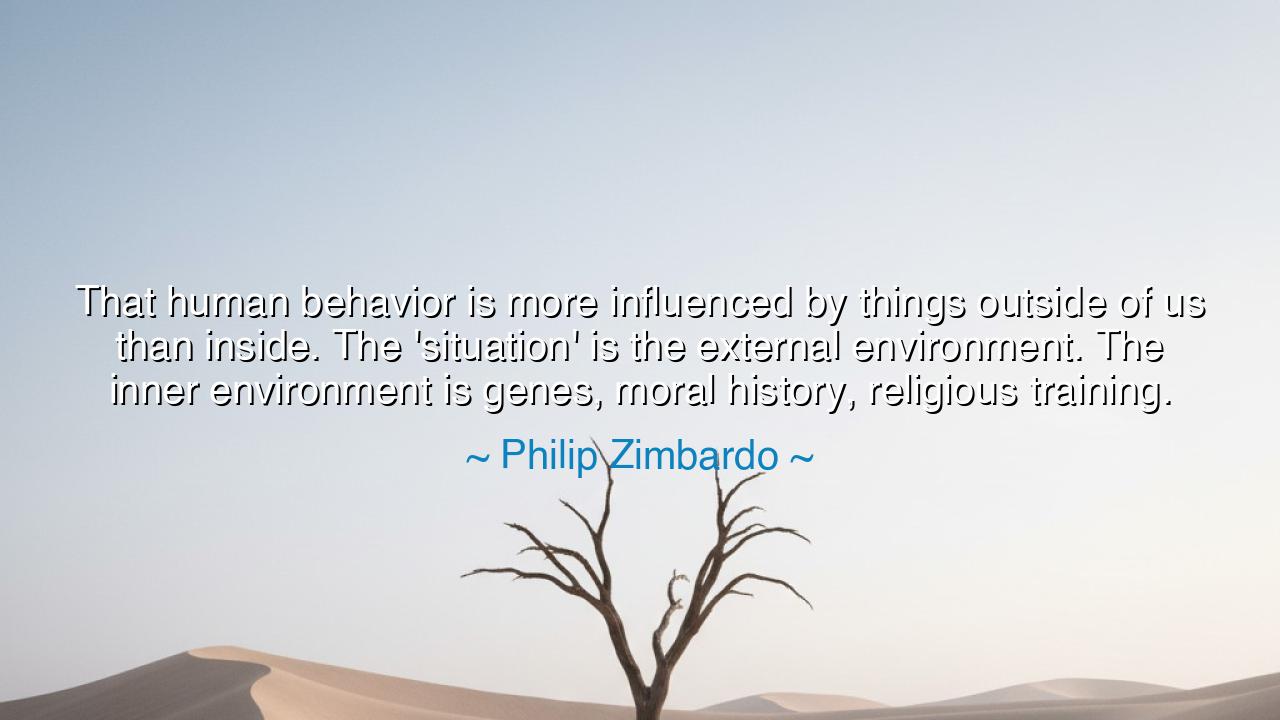
That human behavior is more influenced by things outside of us
That human behavior is more influenced by things outside of us than inside. The 'situation' is the external environment. The inner environment is genes, moral history, religious training.






In the solemn voice of the scholar and sage, Philip Zimbardo declared: “That human behavior is more influenced by things outside of us than inside. The ‘situation’ is the external environment. The inner environment is genes, moral history, religious training.” These words unveil a truth both humbling and profound—the truth that man, though proud of his free will, is often a child of circumstance, swayed by forces he scarcely perceives. The ancients spoke of fate and the gods; the modern age speaks of situations and systems. Yet the essence remains unchanged: the battlefield of good and evil does not dwell only within the heart—it also rages in the world that surrounds it.
Zimbardo, a seeker of the mind’s deepest shadows, spoke these words in reflection upon his famed Stanford Prison Experiment, a trial that revealed the fragile boundary between virtue and cruelty. Ordinary men, clothed in the authority of guards, became harsh and oppressive. Others, assigned as prisoners, grew submissive and broken. What divine spark had left them? None—it was not their inner environment that had decayed, but the situation that had drawn forth the darker impulses of human nature. The lesson, ancient as it is haunting, is that even the righteous may stumble when the world tempts them with power or fear. For man is both sculptor and clay, shaped as much by the world as by the soul that inhabits it.
In this, Zimbardo echoed the wisdom of the ancients, who knew that the city shapes its citizens as much as the citizens shape the city. The philosopher Plato, in his Republic, spoke of how the structure of society molds the hearts of men. When the city honors gold, the people grow greedy; when it honors virtue, they grow noble. Thus, the external environment is no mere backdrop—it is the silent teacher, the invisible force that whispers into the conscience of every man and woman. A corrupted environment can make monsters of the gentle; a righteous one can raise saints from the soil of hardship.
Consider, my listeners, the tale of Germany in the 1930s, when an entire nation—educated, cultured, and devout—was led astray by the storm of ideology. The people did not wake one morning and choose evil; rather, their situation—economic despair, political fear, social pressure—wove a net around their better nature. In such a time, the individual conscience faltered beneath the weight of the collective madness. This, too, was Zimbardo’s warning: that the forces outside us can seduce the heart, distort reason, and make the unthinkable seem ordinary. Yet within that same darkness, he also saw the potential for redemption—for if the situation can corrupt, it can also uplift.
Indeed, the power of the external environment is not solely destructive; it can be the cradle of virtue as well. A compassionate society can nurture compassion in its children; a just community can awaken justice in its people. If we surround ourselves with light, we are more likely to shine. If we dwell among cruelty, we must labor mightily to keep our flame alive. Therefore, the wise do not rely only on inner strength, but also strive to shape the world around them, knowing that both realms—within and without—are threads in the same tapestry of destiny.
Yet the inner environment must not be neglected. Zimbardo spoke not to deny the soul’s power, but to awaken vigilance. Our genes, our moral history, our religious training—these are the roots from which our will draws strength. They are the silent guardians of integrity when the winds of circumstance howl. To cultivate them is to prepare for the trials that the outer world will bring. The man who tends his inner garden can endure even in the poisoned air of corruption; but the one who neglects it will wither when temptation comes.
So, my children of thought, take this teaching to heart: guard your soul, but also guard your surroundings. Seek companions who lift you higher. Build societies that reward kindness and truth rather than cruelty and deceit. When you enter a new situation, pause and see how it shapes your mind—ask whether it nourishes or drains the goodness within you. For environment is the sculptor, and you are the marble; but through awareness, you may choose the hand that carves.
And thus we conclude: human behavior is the echo of both worlds—the outer and the inner. To live wisely is to understand this duality, to master both the heart and the horizon. Remember Zimbardo’s insight as a sacred warning and a hopeful promise: if the world can make us cruel, it can also make us kind. Therefore, be the builder of environments, not their victim. Create spaces where virtue thrives, where truth is honored, and where the human spirit may walk unchained beneath the sun.






AAdministratorAdministrator
Welcome, honored guests. Please leave a comment, we will respond soon